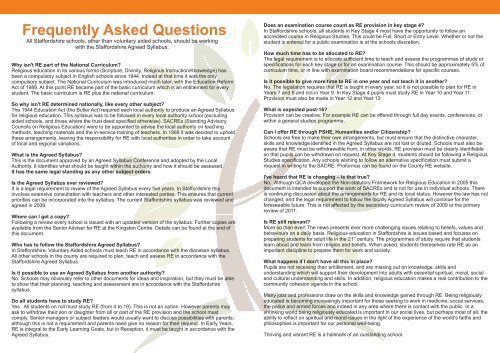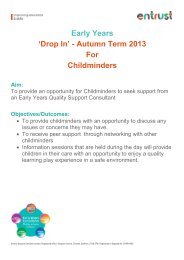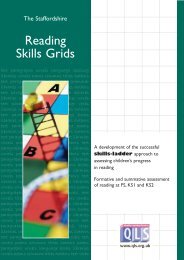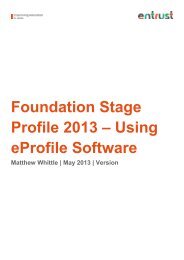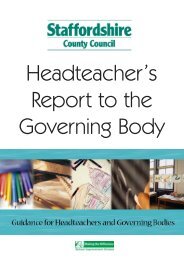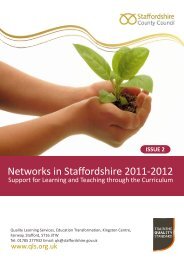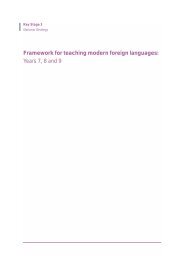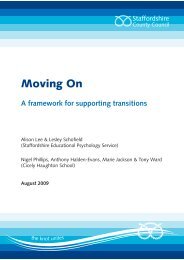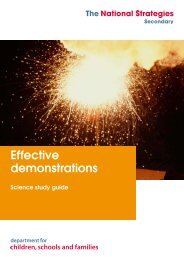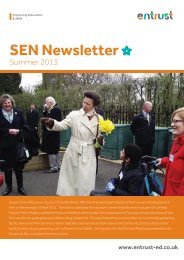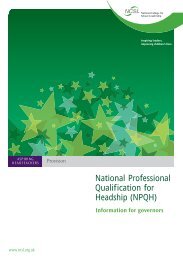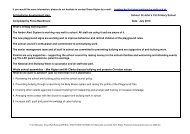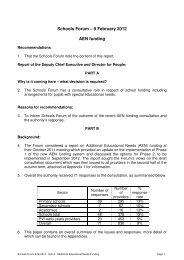Religious Education in Staffordshire: Frequently Asked Questions
Religious Education in Staffordshire: Frequently Asked Questions
Religious Education in Staffordshire: Frequently Asked Questions
Create successful ePaper yourself
Turn your PDF publications into a flip-book with our unique Google optimized e-Paper software.
<strong>Frequently</strong> <strong>Asked</strong> <strong>Questions</strong><br />
All <strong>Staffordshire</strong> schools, other than voluntary aided schools, should be work<strong>in</strong>g<br />
with the <strong>Staffordshire</strong> Agreed Syllabus.<br />
Why isn't RE part of the National Curriculum?<br />
<strong>Religious</strong> education <strong>in</strong> its various forms (Scripture, Div<strong>in</strong>ity, <strong>Religious</strong> Instruction/Knowledge) has<br />
been a compulsory subject <strong>in</strong> English schools s<strong>in</strong>ce 1944. Indeed at that time it was the only<br />
compulsory subject. The National Curriculum was <strong>in</strong>troduced much later, with the <strong>Education</strong> Reform<br />
Act of 1988. At this po<strong>in</strong>t RE became part of the basic curriculum which is an entitlement for every<br />
student. The basic curriculum is RE plus the national curriculum.<br />
So why isn't RE determ<strong>in</strong>ed nationally, like every other subject?<br />
The 1944 <strong>Education</strong> Act (the Butler Act) required each local authority to produce an Agreed Syllabus<br />
for religious education. This syllabus was to be followed <strong>in</strong> every local authority school (exclud<strong>in</strong>g<br />
aided schools, and those where the trust deed specified otherwise). SACREs (Stand<strong>in</strong>g Advisory<br />
Councils on <strong>Religious</strong> <strong>Education</strong>) were to be appo<strong>in</strong>ted to advise the local authority on teach<strong>in</strong>g<br />
methods, teach<strong>in</strong>g materials and the <strong>in</strong>-service tra<strong>in</strong><strong>in</strong>g of teachers. In 1988 it was decided to uphold<br />
these arrangements, leav<strong>in</strong>g the responsibility for RE with local authorities <strong>in</strong> order to take account<br />
of local and regional variations.<br />
What is the Agreed Syllabus?<br />
This is the document approved by an Agreed Syllabus Conference and adopted by the Local<br />
Authority. It identifies what should be taught with<strong>in</strong> the authority and how it should be assessed.<br />
It has the same legal stand<strong>in</strong>g as any other subject orders.<br />
Is the Agreed Syllabus ever reviewed?<br />
It is a legal requirement to review of the Agreed Syllabus every five years. In <strong>Staffordshire</strong> this<br />
<strong>in</strong>volves extensive consultation with teachers and other <strong>in</strong>terested parties. This ensures that current<br />
priorities can be <strong>in</strong>corporated <strong>in</strong>to the syllabus. The current <strong>Staffordshire</strong> syllabus was reviewed and<br />
agreed <strong>in</strong> 2009.<br />
Where can I get a copy?<br />
Follow<strong>in</strong>g a review every school is issued with an updated version of the syllabus. Further copies are<br />
available from the Senior Adviser for RE at the K<strong>in</strong>gston Centre. Details can be found at the end of<br />
this document.<br />
Who has to follow the <strong>Staffordshire</strong> Agreed Syllabus?<br />
In <strong>Staffordshire</strong>, Voluntary Aided schools must teach RE <strong>in</strong> accordance with the diocesan syllabus.<br />
All other schools <strong>in</strong> the county are required to plan, teach and assess RE <strong>in</strong> accordance with the<br />
<strong>Staffordshire</strong> Agreed Syllabus.<br />
Is it possible to use an Agreed Syllabus from another authority?<br />
No. Schools may obviously refer to other documents for ideas and <strong>in</strong>spiration, but they must be able<br />
to show that their plann<strong>in</strong>g, teach<strong>in</strong>g and assessment are <strong>in</strong> accordance with the <strong>Staffordshire</strong><br />
syllabus.<br />
Do all students have to study RE?<br />
Yes. All students on roll must study RE (from 4 to 19). This is not an option. However parents may<br />
ask to withdraw their son or daughter from all or part of the RE provision and the school must<br />
comply. Senior managers or subject leaders would usually want to discuss possibilities with parents,<br />
although this is not a requirement and parents need give no reason for their request. In Early Years,<br />
RE is <strong>in</strong>tegral to the Early Learn<strong>in</strong>g Goals, but <strong>in</strong> Reception, it must be taught <strong>in</strong> accordance with the<br />
Agreed Syllabus.<br />
Does an exam<strong>in</strong>ation course count as RE provision <strong>in</strong> key stage 4?<br />
In <strong>Staffordshire</strong> schools, all students <strong>in</strong> Key Stage 4 must have the opportunity to follow an<br />
accredited course <strong>in</strong> <strong>Religious</strong> Studies. This could be Full, Short or Entry Level. Whether or not the<br />
student is entered for a public exam<strong>in</strong>ation is at the schools discretion.<br />
How much time has to be allocated to RE?<br />
The legal requirement is to allocate sufficient time to teach and assess the programmes of study or<br />
specifications for each key stage or for an exam<strong>in</strong>ation course. This should be approximately 5% of<br />
curriculum time, or <strong>in</strong> l<strong>in</strong>e with exam<strong>in</strong>ation board recommendations for specific courses.<br />
Is it possible to give more time to RE <strong>in</strong> one year and not teach it <strong>in</strong> another?<br />
No. The legislation requires that RE is taught <strong>in</strong> every year, so it is not possible to plan for RE <strong>in</strong><br />
Years 7 and 8 and not <strong>in</strong> Year 9. In Key Stage 4 pupils must study RE <strong>in</strong> Year 10 and Year 11.<br />
Provision must also be made <strong>in</strong> Year 12 and Year 13<br />
What is expected post-16?<br />
Provision can be creative. For example RE can be offered through full day events, conferences, or<br />
with<strong>in</strong> a general studies programme.<br />
Can I offer RE through PSHE, Humanities and/or Citizenship?<br />
Schools are free to make their own arrangements, but must ensure that the dist<strong>in</strong>ctive character,<br />
skills and knowledge identified <strong>in</strong> the Agreed Syllabus are not lost or diluted. Schools must also be<br />
aware that RE must be withdrawable from; <strong>in</strong> other words, RE provision must be clearly identifiable<br />
so that pupils can be withdrawn on request. At Key Stage 4, students should be follow<strong>in</strong>g a <strong>Religious</strong><br />
Studies specification. Any schools wish<strong>in</strong>g to follow an alternative specification must submit a<br />
request <strong>in</strong> writ<strong>in</strong>g to the SACRE. Proformas can be found on the County RE website.<br />
I've heard that RE is chang<strong>in</strong>g – is that true?<br />
No. Although QCA developed the Non-statutory Framework for <strong>Religious</strong> <strong>Education</strong> <strong>in</strong> 2005 this<br />
document is <strong>in</strong>tended to support the work of SACREs and is not for use <strong>in</strong> <strong>in</strong>dividual schools. There<br />
is cont<strong>in</strong>u<strong>in</strong>g discussion about the arrangements for RE and its local status. However the law has not<br />
changed, and the legal requirement to follow the locally Agreed Syllabus will cont<strong>in</strong>ue for the<br />
foreseeable future. This is not affected by the secondary curriculum review of 2009 or the primary<br />
review of 2011.<br />
Is RE still relevant?<br />
More so than ever! The news presents ever more challeng<strong>in</strong>g issues relat<strong>in</strong>g to beliefs, values and<br />
behaviours on a daily basis. <strong>Religious</strong> education <strong>in</strong> <strong>Staffordshire</strong> is issues based and focuses on<br />
st<br />
prepar<strong>in</strong>g students for adult life <strong>in</strong> the 21 century. The programmes of study require that students<br />
learn about and learn from religion and beliefs. When asked, students themselves rate RE as an<br />
important discipl<strong>in</strong>e to prepare them for work and society.<br />
What happens if I don't have all this <strong>in</strong> place?<br />
Pupils are not receiv<strong>in</strong>g their entitlement, and are miss<strong>in</strong>g out on knowledge, skills and<br />
understand<strong>in</strong>g which will support their development <strong>in</strong>to adults with essential spiritual, moral, social<br />
and cultural understand<strong>in</strong>g and skills. In addition, religious education makes a real contribution to the<br />
community cohesion agenda <strong>in</strong> the school.<br />
Many jobs and professions draw on the skills and knowledge ga<strong>in</strong>ed through RE. Be<strong>in</strong>g religiously<br />
educated is becom<strong>in</strong>g <strong>in</strong>creas<strong>in</strong>gly important for those seek<strong>in</strong>g to work <strong>in</strong> medic<strong>in</strong>e, social services,<br />
the police and armed forces and <strong>in</strong>deed <strong>in</strong> any area where there is contact with the public. In a<br />
shr<strong>in</strong>k<strong>in</strong>g world be<strong>in</strong>g religiously educated is important <strong>in</strong> our social lives, but perhaps most of all, the<br />
ability to reflect on spiritual and moral issues <strong>in</strong> the light of the experience of the world's faiths and<br />
philosophies is important for our personal well-be<strong>in</strong>g.<br />
Thriv<strong>in</strong>g and vibrant RE is a hallmark of an outstand<strong>in</strong>g school.


